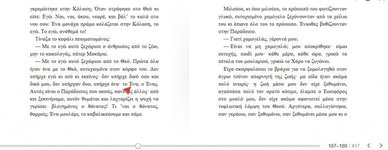You are using an out of date browser. It may not display this or other websites correctly.
You should upgrade or use an alternative browser.
You should upgrade or use an alternative browser.
το Ένα, ο Ένας
- Thread starter altan
- Start date
Theseus
¥
In Turkish it means (if my Turkish isn't very rusty) 'Bir Evren, Bir Olma'. It is not a comment or an idiom. The Turkish yorum ('comment'), which Altan may have had in mind, can also mean 'interpretation'. A general question, is it possible in translation to mark the subtle distinction between the neuter & the masculine definite article? 'One cosmos, one Being' hardly does that. And why is 'cosmos' all in lower case, while 'Being' is capitalised? It is a phrase very hard to translate: 'One Undifferentiated Whole' perhaps?
Obviously what the author means here is the philosophical First Principle, or First Cause, the ultimate starting point out of which the Universe flew. It is given a neuter name very appropriately, since it has no gender, being above any gender and any attribute. But the author just wanted to approach it from a more familiar point, and since the Christian God is masculine, he just added the One's name in masculine.
altan
Member
I don't understand the question. If the Greek is "το Ένα, ο Ένας" and the English is "one cosmos, one Being", it's a translation, not a comment.
Hi Nickel,
But I become a τρελός by translator's very very unnecessary additions to Kazantzakis.
pontios
Well-known member
I wonder whether a simple "the Oneness, the One" could serve as a safe translation here.
Why not?
Maybe, even, "the Oneness, His Oneness" ? ..(a small departure, I realise - but we can introduce the masculine gender this way).
altan
Member
Very well, Nickel.I wonder whether a simple "the Oneness, the One" could serve as a safe translation here.
Theseus
¥
Perhaps then simply 'The One, impersonal or personal.' Could Kazantzakis have had Parmenides in mind? See http://www.parmenides-of-elea.net.
Perhaps then simply 'The One, impersonal or personal.' ...
Perhaps, but that's not literature; it's an essay.
Theseus
¥
Agreed,Daeman. Maybe I'm 'overcooking' it :cheek the latest new word: any Greek equivalents?). There is a real difficulty here in translation. The translation has got to be simple, yet profound. I found 'Report to Greco' to be a brilliant book & riveting readingI it it is clear how much philosophy Kazantzakis has read. Altan has a point, as our contributions prove. As you know Turkish has no gender as such: indefinite or definite articles will be hard to express in that language. I wonder if there is a Turkish translation of this passage. This distinction between Το Ένα, ο Ένας can't be made.;)
the latest new word: any Greek equivalents?). There is a real difficulty here in translation. The translation has got to be simple, yet profound. I found 'Report to Greco' to be a brilliant book & riveting readingI it it is clear how much philosophy Kazantzakis has read. Altan has a point, as our contributions prove. As you know Turkish has no gender as such: indefinite or definite articles will be hard to express in that language. I wonder if there is a Turkish translation of this passage. This distinction between Το Ένα, ο Ένας can't be made.;)
All our attempts (my own included) seem to me in English to be stilted or wordy. The original is laconic & quite clear.
All our attempts (my own included) seem to me in English to be stilted or wordy. The original is laconic & quite clear.


